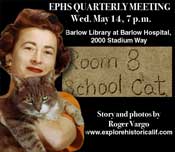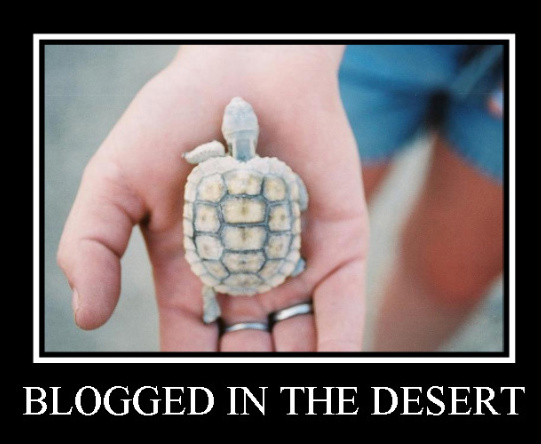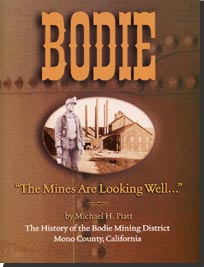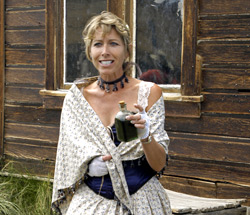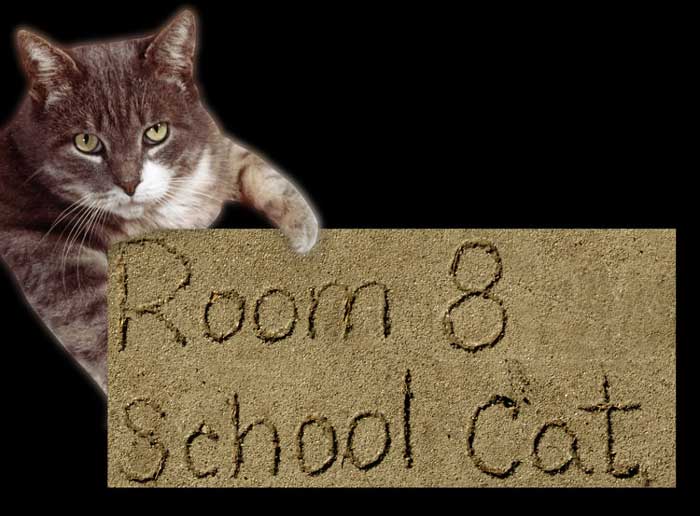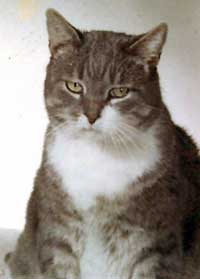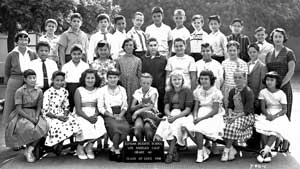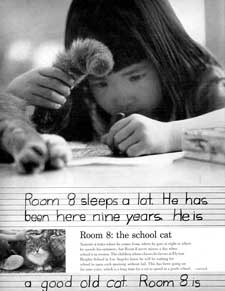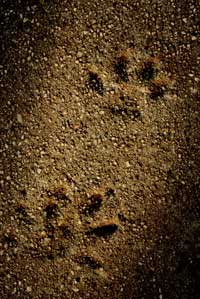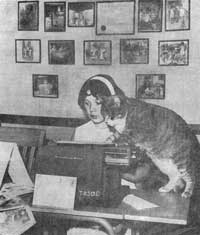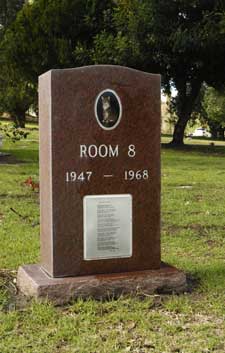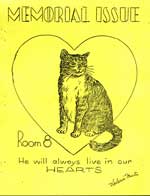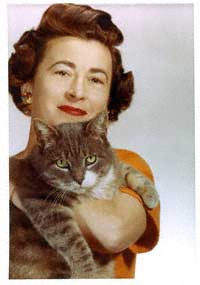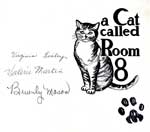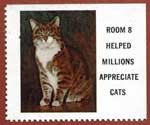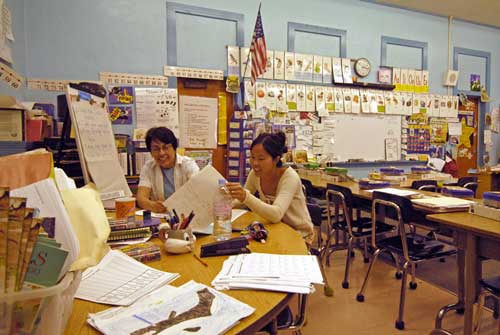|
|

|
Room 8, The Most Famous Cat in Los Angeles by Roger Vargo |
||||||||||||||||||||||||||||||||||||||||||||||||||||||||||||||||||||||||||||||||
He was portly, gray even at a young age, and liked to drink from faucets. He slept on desks, under desks and on rugs. He roamed halls and entered classrooms with impunity. He was Room 8, the most famous cat in Los Angeles. He was my friend and schoolmate.
Room 8 was a large, shorthair gray striped tabby cat who adopted Elysian Heights Elementary School in Echo Park. He showed up one day in 1952 and stayed at the school until his death in 1968. Except for summer vacations─Room 8 disappeared each summer, and then returned to school on the first day of classes in September. I first became acquainted with Room 8 in 1956 when I was in kindergarten. Our teacher, Miss Allen, told us about the cat, and his story, but I thought she said his name was "Room Mate." It made sense, too, as the cat was the roommate of all the students at the school. Former student Angie (Medrano) Nicolai, who graduated in 1965, remembers kindergarten, "My first recollection of Room 8 was Miss Mason introducing him to our kindergarten class. I remember thinking that he was a big cat in her arms. She wanted us to know that he belonged to the school and that there may be times he would come into our classroom to visit. She put him down and he immediately jumped up on the desk next to the window to take a nap in the warm sun." Like most elementary schools in the 1950's, Elysian Heights had lots of rules. Don't talk in class. Wait in line. Raise your hand. Don't run in the hallway. No talking for the first ten minutes at lunch. All these rules were dwarfed in comparison to THE RULE. I remember from later years transgressors of THE RULE returning palled from a session in the office with Miss Mason, the principal. And these were the very boys who snickered at authority, ran in the hallway and talked during the first ten minutes of lunch. There were few, if any, second violators of THE RULE. For me THE RULE was easy to follow. I adored cats. Former teacher, Bob Bedwell recalled, "I saw one kid move (his seat) because the cat took his place." THE RULE, of course, was "Don't bother the cat."
One former student said, "I never liked Room 8 because he sat on my homework." Former teacher Richard Arrow recalled that in deference to THE RULE, he appointed a student as "cat remover" whose job it was to relocate the tubby tabby when he interfered too much with classroom operations. Former teacher Ray Howell recalled Room 8 as "a very important member of the faculty," who occasionally slept on his foot while he was lecturing. Room 8 came to Elysian Heights in 1952. "It was 1952 when a cat walked into the school. Many of the students who saw him are grown-ups now." wrote Beverly Mason and Virginia Finley in Room 8's biography, "A Cat Called Room 8" (published in 1966). "The cat walked around the room. He jumped up and walked on the desks. Hands reached out and petted him. Someone said, 'This I the skinniest cat I've ever seen.' " The children gave the cat some milk and went out for recess. When they returned, they discovered their lunches had been raided and the cat was fast asleep.
Later, the cat followed the children to lunch. According to the book, "The children gave him food from their lunches. He ate, and he ate, and he ate! Then, he walked across the playground and out the gate." The following morning, the children were met by the cat who followed them into the classroom. Overcoming objections from the teacher, the cat was eventually adopted by the children, but he still didn't have a name. One student said, "Why not call him ‘Room 8', since that is the number of our room?" Mason wrote in 1968, "No one knew where he went at night or during vacation. Like the swallows of Capistrano, he returned every September for the opening of school to sleep on the desks of children. Finally, he became the school mascot." According to Mason, Room 8 was a neighborhood cat who was born in 1947 and was mistreated by a boarder in the home where he lived. Room 8's notoriety began to grow. The local news media began to take notice of his annual autumnal return to school. To students such as me, he was just part of the everyday scene at school. After all, didn't every school have a famous mascot? He usually could be seen patrolling the hall or asleep in some warm, sunny spot. He frequently made an appearance during lunch. Even though feeding him was discouraged, he didn't discourage handouts when sampling delicacies from our little metal lunch pails. Room 8 was no longer a skinny cat. He had grown to be a big boy! I don't remember much about our student government organization at Elysian Heights. I do remember, though, the most important position a student could hold wasn't that of student body president. It was the cat feeder.
The cat feeder or cat monitor wasn't an elected position. That most prestigious of all positions was appointed from within the ranks of the sixth grade class by collaboration between the teacher and Principal Beverly Mason. An added benefit of being the cat feeder was having access to that most secret and restricted area on campus, the teachers' lounge, where Room 8 dined. The chosen one also got to hold Room 8 for the annual sixth grade class portrait. Room 8's fame grew beyond the borders of Echo Park, or even Los Angeles. LOOK magazine ran a three page spread by photographer Richard Hewett in November 1962, titled
"Room 8: The School Cat". His biography, written by principal Mason and teachers Finley and Valerie Martin was published by Putnam's in 1966. Room 8 made personal appearances with Mason and his feeders at local cat shows and community groups. He was made an honorary member of various organizations. A short article about him appeared in the Weekly Reader (a national newspaper for elementary school pupils) in January, 1967. He appeared on Art Linkletter's "House Party" television show several times and was featured in a segment of the 1968 NBC-David L. Wolper television documentary, "Big Cats, Little Cats." Teacher Shari Kerr later wrote, "I remember the many times radio, television, and newspaper people came to visit our classroom, Room 8. The only calm member of our class was Room 8. We were always nervous but to him it was routine and he was a ham actor." Room 8 is remembered in different ways. Beverly Graham, whose children attended Elysian Heights, and now has a grandchild attending the school said, "He was always there. (He was a) great cat. Everybody liked him." Jean Baird, a former school clerk said, "Room 8 gave the school something that the students liked-a symbol-a cat taken in and cared for." Former student John Hernandez remembers, "I had the opportunity to know Room 8 on a personal basis. Room 8 stayed the entire summer with our family and our two cats. I believe it was 1962. Room 8 had, on various occasions, appeared at our backyard door looking for a meal which we obliged. There might be a chance the he had fathered our female's last litter of six. Three of the kittens had the markings of a grey tabby, just like Room 8. We gave all six kittens to local folks, so it wouldn't surprise me to find out that the Room 8 lineage still roams the neighborhood." Former kindergarten teacher Toshi Ito remembered, "He loved flowers. He smelled flowers in the garden. He liked to drink out of the faucet." Virginia Nakano said (of Room 8's later years), "He slept at our house-slept all over the place. The cat didn't want to be bothered (by children). He wanted to eat and sleep." Former teacher Bob Bedwell recalled, "He never had an accident as far as I can tell." Betts Hall, whose daughter attended Elysian Heights remembered, "He waddled along the eraser tray and would wipe off everything on the lower part of the blackboard." David Pierce, a former student said of Room 8, "I was an object in his world. He was a very demonstrative kitty (but) he didn't go out of his way to be petted."
Room 8's paw prints were imbedded in wet cement in the front of the school on June 11, 1964. Held gently by custodian Sam Ross, "Everyone cheered! Television cameras rolled as he walked across the wet cement with his tail and head high," recall Mason and Finley in "A Cat Called Room 8." The paw prints and inscription, "Room 8-School Cat," while worn from the passage of time and foot steps, survive to this day.
Years later, guitarist Leo Kottke saw the paw prints and inscriptions in concrete outside the school and asked his manager, who lived nearby, about them. Kottke wrote an instrumental called "Room 8," that was included in his 1971 album, "Mudlark." "It is an unusual tune because of the way it moves," said Kottke, "It took about a month to write." By Mason's account, Room 8 received over 10,000 fan letters from 47 states and several foreign countries. Sometimes he received more than 100 letters in one day, but the average was about 30 letters a month. While many of the letters were properly addressed, some were sent to "Room 8, Los Angeles, California," or "The Cat, Los Angeles, California."
The volume of mail created an educational opportunity of sorts for some students in the fifth and sixth grades who were conscripted to be Room 8's "secretaries". They answered each piece of mail and signed it with a rubber stamp of Room 8's paw print. Juanita Buck, Virginia Finley's sister, recalled Finley telling her much of the profits from the book were used to pay postage responding to Room 8's fan mail. This was an era where people wrote letters by hand, or at best with a typewriter. There was no email. The gray tabby mascot's popularity generated a revenue stream on behalf of the students. Some of his fan mail contained donations which were used, according to Mason, to buy books for the school library. After the Room 8 book was published, the school held occasional book sales in support of the library. Throughout my seven years at Elysian Heights, I never recall thinking about Room 8's age. He was there before I arrived and was there after I left. It wasn't until I began researching this story that I became aware of how old he really was. My perception of age as a child is quite different from my perception of age today. Assuming Mason's information is accurate as to his birth year, Room 8 would have been about nine years old when I walked on the school grounds as a kindergartener and about 17 years old when I said goodbye to him as a sixth grader in 1963. As he aged, Room 8 began to have health problems. He lost some teeth. He was injured in a cat fight in November, 1963. He nearly died of pneumonia in December, 1964. After recuperating at the Lockhart Animal Hospital in Hollywood, he spent nights and vacations with the Nakano family who lived near the school. This was the first time, according to Mason; he was willing to accept a nighttime home. Mason wrote, "Many times, neighbors helped search
the hills and looked under bushes for Room 8 who hadn't arrived back at the Nakano home. Sometimes it was dark, and flashlight crews were organized before he was found sleeping in a garden or visiting a neighbor."
Custodian Sam Ross wrote, "It was my privilege to carry him in my lap when he was driven for his yearly doctor's visit. As he grew older he waited for me to carry him to the Nakano's at night. He knew I'd see him safely across the street." Teacher J. Van Heuklon wrote, "As Room 8 grew older, he enjoyed attention even more. He showed me I wasn't giving him enough attention one day by slowly placing himself in my lap. Even though seventeen pounds of cat is a lapful it was a good feeling to have him gently purring and kneading his claws in my lap." Old even by today's standards, Room 8 lived another four years after his bout with pneumonia. Mason wrote, "Summer school was held for the first time since 1962, and Room 8 came faithfully every day until he became ill and was taken to the hospital." Room 8 died August 13, 1968 at the age of 22 years. The Long Beach Press Telegram wrote on August 14, "SCHOLARLY FELINE Cat Named Room 8 Loses the Last of 9 Lives- Room 8, a white and gray tomcat with a grammar school education, died Tuesday of a kidney ailment. He was 22, equivalent to 154 human years. The cat with the funny name is survived by pupils who have attended Elysian Heights School since 1953, the year he decided to make the school his home and the children his mascots." If a measure of one's importance in Los Angeles is by the size of one's obituary in the Los Angeles Times, then the beloved gray and white tabby was important. His obituary, written by Dial Torgeson, ran three columns, with a jump and a three column photo on the front of the second section of the paper. Room 8 was laid to rest at the Los Angeles Pet Memorial Park in Calabasas on August 15, 1968. Former teacher Bedwell and former clerk Baird attended the ceremony. "There was a procession (from the school) to the cemetery using three cars. There were 10-12 people at the funeral. It wasn't a huge group." Bedwell said there was a viewing of Room 8's body, "He was in a coffin curled up."
The following day, City News Service wrote, "Room 8, the cat who loved children and for 15 years made Elysian Heights Elementary School his home, was buried in Calabasas Thursday. School is out for the summer and the kids he adored are scattered far from the scene of the playground they shared with the black and white tomcat. Even so the bouquets arrived at the Calabasas Pet Cemetery. The Nakano family, with whom Room 8 lived at night for many years, personally laid a heart-shaped wreath across the grave. The wreath was made of roses and carnations which were Room 8's 'favorite flower'. Later a monument will be placed at the gravesite with his picture and a simple epitaph to the cat who died of a kidney ailment Tuesday." The Christian Science Monitor wrote, "In these times of pressured stands on fundamental issue. It is heartwarming to be reminded of another kind of commitment carried on for 15 years by a cat and the children of a Los Angeles primary school. The faithfulness and affection he stirred will continue to register in the thoughts of the many who have heard of him." Echo Park's community newspaper, the Parkside Journal, wrote, "Room 8's life was worthwhile and he made a contribution through his love for children and response to adults. The thousands of letters he received and answered through students brought happiness to many people and children throughout the world."
Room 8 was important to the school and the community at large in many ways. To some, like Julie (O'Neal) Hines, he was a substitute for the pet she couldn't have at home. "I was lucky to be one of the sixth graders who got to feed the cat in the teachers' room every day. We weren't allowed to have pets in my home, so a quick cuddle of Room 8's fat furry body was always a welcome thing. Miss Mason did her best to give the inner city Echo Park kids the experience of the small urban farm that she created on one corner of the schoolyard." Angie Nicolai was also a cat feeder, "It was my honor that Miss Mason selected me when I was in the sixth grade. My primary responsibility was feeding him lunch which meant hunting through every classroom to find him. Sometimes he knew it was feeding time and I found him walking towards the teacher's lounge just as I got to the hallway." Third grader Vivian DeLeon wrote in 1968, "Room 8 was a good cat. I liked him very much. He was the greatest cat in the whole world." Soledad Mendoza summed it up, "He walked into my heart and found a special place."
Miss Beverly Mason, the long-time principal of Elysian Heights, was Room 8's spokesperson, benefactor and alter ego. He was she, and she was he. She stayed in the background while he basked in the light of public attention. Former teacher Bedwell said, "She was a fantastic woman, yet very private." Richard Arrow, the former teacher, recalls Mason as "a dynamic leader and principal." Betts Hall recalled Mason as an "amazing woman." "She made things happen. Animals were her big love." Former student Pierce said, "I didn't know how special she was until many years later as an adult. She worked to give us inner city kids as rich an experience as she could." Elise Ozan, a former teacher said of Mason, "This woman did everything she could to advance young people. She did everything she could to make certain the kids had a well rounded education." Mason, teacher Virginia Finley and L.A. Unified School District art consultant Valerie Martin collaborated in 1964 and 1965 to write "A Cat Called Room 8." Mason and Finley wrote the text while Martin drew the illustrations. The book was published in 1966 by G. P. Putnam's Sons and went through six printings. Students could buy the book for $2.50. It can still be found through vintage book vendors and in the reference section of many libraries.
Even though modestly referred to as the teacher, "Miss White", in the book, it was Virginia Finley, according to her sister Juanita Buck, who took the skinny gray tomcat in on that day in 1952. The book only alludes to it in the credits by saying Finley was a teacher at the school in 1952 when the cat arrived. It's been forty years, this year, since the beloved gray tabby's shadow crossed Elysian Heights' playground for the last time. All of the principal individuals mentioned in the book have passed on, too. Dr. Ted Haskell, Room 8's long time veterinarian died in 1975. Beverly Mason died in a vehicle accident in 1991. Valerie Martin died in 1993. Virginia Finley, who administered the estates of both Mason and her mother, Alice Bradish, died in 2000. Samuel Ross, the school custodian who cared for Room 8 and the children of Elysian Heights in more ways than anyone will ever know, died in 2004. While Room 8 no longer roams the hall of Elysian Heights or the streets of Echo Park, his legacy remains. The Room 8 bed fund at Orthopedic Hospital was established, according to a story in the Elysian Courier school newspaper, November 1968. "Twenty children from our school donated $10 to start the Room 8 Fund at the Orthopedic Hospital." According to a hospital newsletter article, "The children decided that there should be a living memorial for Room 8 and that it should go, as he had, beyond the school walls. They decided to establish the memorial to help other children be able to run and play with animals." The first contributions to the fund were personally delivered to the hospital by the children who also brought a copy of the Room 8 book and painting of Room 8 to hang in the schoolroom. The fund brought in more than $10,000. That amount of money represented a considerable amount of hospital services at the time. A drive began in 1969, started by Lois Spears, to promote the issue a postage stamp in honor of Room 8. According to an article written by Mason in All Cats magazine in January,
1976, more than a half million people throughout the U.S., Asia and Europe signed a petition asking the U.S. Postal Service to issue a Room 8 commemorative stamp to honor all cats for the part they play in the lives of people. That goal is still unachieved today. The Pet Pride organization issued a private commemorative stamp with Room 8's image in the 1970's. Hettie Perry founded the Room 8 Memorial Cat Foundation in Pasadena in 1972. The no-kill shelter is now located in Riverside, California. A painting of Room 8 hangs in the shelter. The organization is the last remaining vestige of Room 8's charitable past and is supported by donations. A Wickipedia entry on the community of Elysian Heights concludes, "Elysian Heights was also home to, ‘Room 8 the Cat', arguably, the most famous cat in America." An Echo Park Historical Society web and print story by Jenny Burman on the famous feline begins, "Mystique Endures for Echo Park's ‘Most Famous Cat in the World'. Put simply, Room 8 was - is - one of the Echo Park's most famous residents, and, between rock stars, art stars, writers and intellectuals, political luminaries, we have quite had our share." Find A Grave, a website listing the final resting places of famous individuals, shows photos of Room 8's grave and displays more than 300 messages and virtual flowers left in his memory. One message from a young girl named Allie posted in 2005 reads, "I am in the second grade at Union School. Last night I read a story in my reading book about you. My grandmother said it was a true story and she looked you up on the internet. I was happy to see your picture. Thank you for being a school cat. I wish I could pet you." Dr. Joseph Black posted in 2003 "Room Eight taught not only the students of Elysian Heights, but millions of other eager young minds around the country, about renewal and of the inevitably of loss in a most heartwarming way." A photo of Room 8's granite headstone is featured prominently on a page about the Calabasas pet cemetery in the book, Weird California by Bishop, Oesterle and Marinacci. T. Hanson, of Nashville, in an on-line review of "A Cat Called Room 8" wrote in 2006, "I didn't attend Elysian Heights until a few years after Room 8 had passed, but he was still a very important part of our school. Every year or so the school would have more books printed and sell them as one of the fundraisers. "At the time I attended Elysian Heights (the 70s), Ms. (sic) Mason was still our principal. The school still received lots of fan mail for Room 8, even in the 70s, and students often had writing assignments responding to other children who wrote asking about Room 8. If you went to Elysian Heights for any period of time, you learned how to write a letter." John Hernandez posted on an Echo Park Historical Society blog in 2007, "He lived a great life. How many cats can say they had an entire neighborhood at their disposal for food, warmth and companionship?"
Room 8's presence is still felt throughout the hall and classrooms at Elysian Heights School. "Elysian Heights School Home of Room 8 School Cat 1952-1968" is inscribed in foot-high letters in concrete at the corner of Baxter Street and Echo Park Avenue. A painting of him hangs in the school office; two paintings greet visitors in the hall next to a large version of his memorial medallion and a bronze statue. He is the centerpiece of a triptych mosaic mural hanging in the school library. His likeness adorns the outside wall of a classroom building and a 2005 mural by Yuriko Etue features the gray feline walking through California history on the side of the school auditorium. His name, likeness and inscriptions devoted to him by children are preserved in concrete along the school's perimeter. Each year teachers, like Edith Vizari and Isabel Lee
who currently teaches first and second graders in room 8, read the book to their students. "I teach at the ‘cat school'," said second and third grade teacher Sheryl Gallo, "Room 8 taught us kindness to all beings and respect for life." Sixth grader Hiroshi Omori wrote in the Elysian Courier, "I remember how Room 8 jumped on my desk and purred. I miss him."
Bibliography A Cat Called Room 8 by Beverly Mason and Virginia Finley illustrated by Valerie Martin G. P. Putnam's Sons, New York (1966)
LOOK Magazine Vol. 26, No. 24, November 20, 1962 "Room 8: the School Cat" Produced by Stanley Gordon Photography by Richard Hewett
Elysian Courier newspaper Vol. X, Issue 1, November 1968
The Story of Room 8 by Beverly Mason August 13, 1968
"A Different Kind of Cat" Orthopedic Hospital Newsletter, March, 1978
"Celibrity Cat--a Rare and Unusual Cat--Room 8" by Beverly Mason All Cats magazine, January 1976 courtesy Donna Larsen
Los Angeles Times via ProQuest historical database various dates
Weird California by Greg Bishop, Joe Oesterle and Mike Marinacci Sterling Publishing Co. (2006) ISBN: 10: 1-4027-3384-4
Chicken Corner blog by Jenn Burman on LA Observed.
The collections of Elysian Heights School, Virginia Finley (courtesy Juanita Buck), Julie O'Neal Hines, Raymond L. Howell, Al Kasselman, Leo Kottke, Al Medrano and Angie Medrano Nicoali, Baeri Penn, David Pierce, Susann Mitsui Takaki, the Echo Park Historical Society, the Los Angeles and Glendale public libraries and the Library of Congress.
Interviews with former Elysian Heights students, teachers and friends. |
|||||||||||||||||||||||||||||||||||||||||||||||||||||||||||||||||||||||||||||||||






